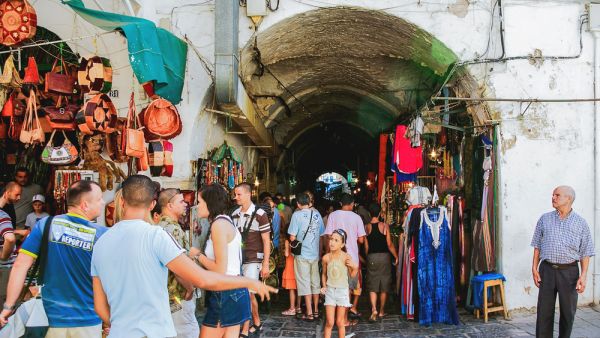Tunisian social entrepreneur Leila Ben-Gacem dreams of turning neglected historic buildings of the medina into profitable cultural and architectural investments that create needed jobs in neighbourhoods with high rates of youth migration.
Ben-Gacem began working towards this dream in 2013, when she restored an old Ottoman palace in the medina.
The result of this project was Dar Ben Gacem, a 17th century Ottoman palace in the medina she converted into an exceptional boutique hotel that preserves the building’s original architecture. This marked the beginning of her success in the industry.
“What is important for us during the restoration process is to preserve the architectural heritage,” Ben-Gacem told the DPA news agency. “Good thing we found what we wanted with artisans who had few opportunities…We look forward to continue the restoration of other buildings with them.”
For Ben-Gacem, the biggest challenge in transforming an old family home into a touristic hotel is equipping it with modern facilities, including state of the art water networks, bathrooms and internet access. “Here we had the greatest difficulty, with a wall 70 centimeters wide. It is like an adventure,” she says.
Dar Ben Gacem opened its doors in the heart of Tunis’s medina in 2013. It is a two-floor, seven-room building overshadowed by Andalusian and Ottoman architecture, and decorated with Roman antiquity pieces. A few years after opening, it succeeded in attracting tourists all throughout the year.
The majority of tourists are explorers who are passionate about eastern civilisation and architecture.. “The tourists come to discover the daily and cultural life of Tunisians in their full details inside the old city,” said Ben-Gacem.
She said her journey was difficult at first but eventually found success and brought in good profit. “The main idea for us is to create different opportunities for cultural tourism. I believe that cultural tourism can provide good economic opportunities.”
As Ben-Gacem found more and more success, the Tunisian social entrepreneur decided to expand her project, transforming part of the medina’s historic old streets into workshops where young artisans help with the restoration process.
“We are a social enterprise. All our profits go to social projects. For example, we support young people in their cultural initiatives in the medina and finance the restoration of old buildings to improve the economic dynamics of culture,” Ben-Gacem said.
Today, her work is facing new challenges due to restrictions imposed because of the coronavirus pandemic. With few tourists, Ben Gacem is not sure if her hotel can hold up and is concerned that the crisis might impact her ambitions to expand and restore other buildings.
“We are trying to adapt to the situation. We have concerns about the future. We do not know how the situation will return to the way it was before,” she said.
Despite the challenges, Dar Ben Gacem has not closed its doors. But now, instead of bringing in tourists, it is welcoming civil society organisers and social workers with the Red Crescent to help prepare and distribute meals to the needy.
This article has been adapted from its original source.








